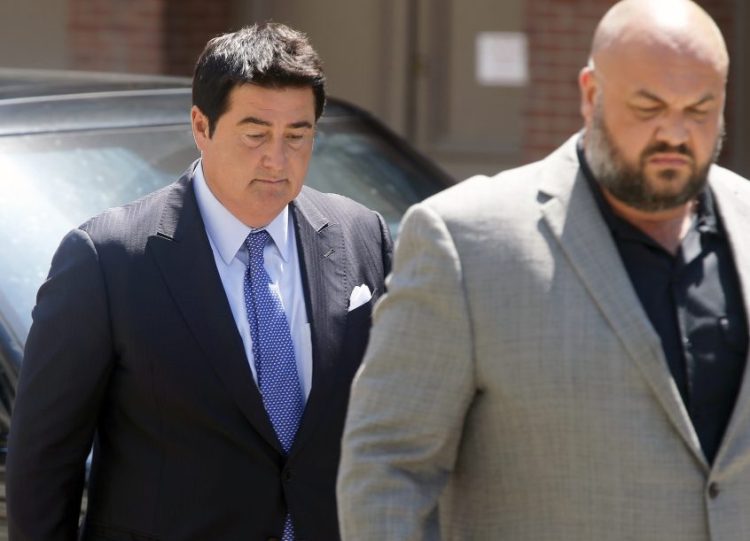Former Portland developer Michael A. Liberty is in legal trouble again, facing charges that he and four others tricked investors into putting about $50 million into a technology startup and then using the money to pay for what federal regulators call a “lavish lifestyle.” Liberty, his wife, his Portland lawyer, a cousin, the cousin’s friend and four shell companies were all charged in a 66-page complaint filed by the Securities and Exchange Commission in federal court in Maine.
It alleges that Liberty and his associates “engaged in a long-running fraudulent scheme using multiple fraudulent securities offerings” to entice investors to put money into what they thought were shares of Mozido, a Texas-based company that Liberty founded to provide financial services to people via their mobile phones. But instead of going to the company, the SEC said, the money was funneled into supporting Liberty’s lifestyle, including chartered flights, multimillion-dollar homes, expensive cars, movie production funding and even a dairy farm.
Liberty, 57, was a leading Portland developer in the late 1980s and was behind the 100 Middle St. office complex and the Chandler’s Wharf waterfront condominium complex in the city. The U.S. Attorney’s offices are now in 100 Middle St.
Liberty grew up in Gray, and left most of his business interests in Maine in the early 1990s after the housing market cooled off and Portland officials clamped tighter restrictions on development to protect the working waterfront. But Liberty continued to own land and have some operations in the state.
Liberty was most recently in Maine in August, when he was sentenced to four months in federal prison and fined $100,000 for a scheme that used relatives and employees to get around campaign finance laws. He served the sentence beginning in September, after delays because of an approaching hurricane and some minor damage to his house near Orlando, Florida.
In addition to the Maine case, Liberty is facing off with the SEC in Philadelphia, where the agency’s lawyers allege he hid assets to convince a federal judge to cut the size of a fine levied on him in connection with allegations that he defrauded investors, including three government pension funds, in that state. The SEC now wants him to pay the full fine of $6 million, which the judge had reduced to $600,000 after Liberty claimed his net worth was a negative $29 million.
SEC officials allege he hid assets to make it look like he was underwater financially, while he continued to live large with expensive homes and pricey vacations.
The latest case alleges that Liberty and the other defendants got investors to put money into shell companies that supposedly contained shares in Mozido that could eventually be transferred to the investors. The SEC said that, in fact, the shell companies either had no stake in Mozido or could not transfer those interests.
Liberty founded Mozido and served as chairman of global strategic initiatives for the company until last year.
According to the complaint, Liberty lied to investors about Mozido’s valuation and finances.
“They tricked investors into believing they were funding fast-growing startup companies,” the complaint said. “There were not.”
In a statement issued Monday, Liberty’s lawyer said he was “dismayed that the SEC has chosen to file this groundless complaint.”
The statement attributed to Jay Dubow of the Pepper Hamilton law firm in Philadelphia said the complaint was being reviewed and “Mr. Liberty will vigorously defend himself” and would “deny most of the substantive allegations” raised by the SEC.
The complaint also names Brittany Abbass Liberty, Liberty’s former bookkeeper and now his wife; a cousin, Rick Liberty; the cousin’s friend, Paul Hess; and George Marcus, Michael Liberty’s Portland-based lawyer.
Marcus denied the allegations through his lawyer, Dan O’Connor.
Five shell companies also are named. Also named is Xanadu Partners as a relief defendant, meaning that it holds money traceable to the individuals and shell companies, but is not necessarily alleged to have committed wrongdoing.
SEC officials in Philadelphia have said that Liberty funneled money into Xanadu to hide his wealth and finance most of his living expenses, while telling the judge he had no money.
The SEC said the individuals and the shell companies sold securities even though they weren’t registered with the SEC.
The agency alleges that Rick Liberty and Hess searched for investors, keeping bookkeeper Abbass informed of their progress. Marcus, the complaint said, provided legal advice to form the vehicles through which investments were made and also drafted legal documents that, the SEC said, “he knew misrepresented material facts and made material omissions.”
When the investments came in, the SEC charged, “Liberty, Abbass and Hess pocketed the bulk of the money raised.”
For instance, the SEC alleged, they transfered $16 million of the first $19.2 million raised into Xanadu Partners, using the money to pay creditors, court fines, settle lawsuits, finance a movie Abbass was producing, pay for interior decorating, pay for charter flights and pay for “hundreds of thousands of dollars in credit card bills,” the SEC said.
The SEC said it filed the complaint in Maine because many of the acts took part in the state, two of the shell companies were incorporated in the state, Marcus lives and practices law in Maine and the Libertys lived in Maine for part of the time the alleged scheme operated.
Some Maine investors were taken in, the SEC said.
Edward D. Murphy can be contacted at 791-6465 or at:
emurphy@pressherald.com
Send questions/comments to the editors.




Comments are no longer available on this story